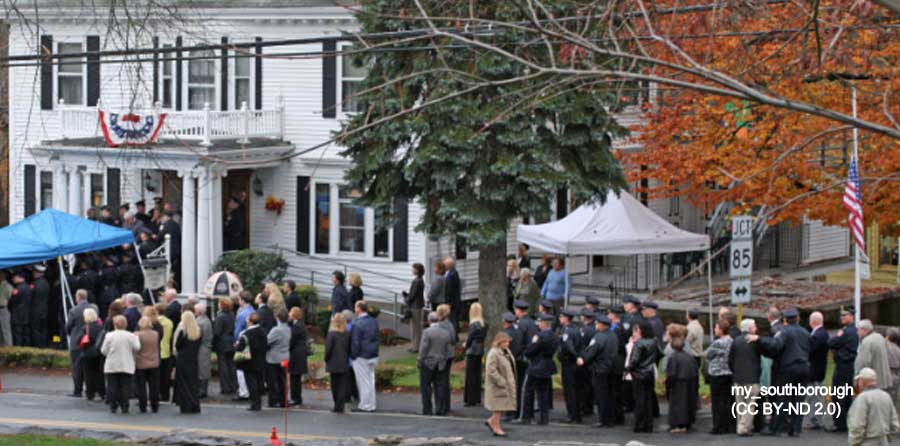
Several years ago, our Justin Nobel discussed the the way some Middle Eastern cultures hire women to weep and wail at funerals. At the time, many many Westerners were surprised by the practice which actually has a very long history.
Turns out, the practice is not only ongoing but growing. In fact, a UK company, Rent A Mourner, is replicating the practice with a few tweaks. These modern mourners are much more discreet. They’ll chat with the others in attendance and be respectively sad.
To read more about Rent A Mourner, click here.
[Original article published May, 15, 2009]
“Call for the mourning women that they may come; and send for cunning women, that they may come, and let them make haste, and take up a wailing for us, that our eyes may run down with tears, and our eyelids gush out with waters.” – Jeremiah ix, 17

“In the industrialized world there has been a steady attempt to control public emotion,” says Tom Lutz, who talks about ‘hired mourners’ in his book, “Crying: The Natural and Cultural History of Tears.” (Photo by Justin Nobel)
Woman getting paid to weep at funerals dates back to antiquity. Israelite funeral processions began with the raspy cries of elderly women, hired by family and friends of the deceased. Their role was to with their wails wring grief.
“The children in the streets through which they passed, often suspended their sports, to imitate the sounds, and joined with equal sincerity in the lamentations,” reads “A Biblical and Theological Dictionary,” a book by Richard Watson and Nathan Bangs.
The Ancient Greeks hired mourners too. Homer described Hector’s funeral:
“A melancholy choir attended around,
With plaintive sighs and music’s solemn sound;
Alternately they sing, alternate flow
The obedient tears, melodious in their woe.”
In the 6th century B.C., Solon, an Athenian poet and statesmen who was distressed by the city’s unchecked greed tried to curb the practice. Two centuries later, Plato denounced it too.
Yet hired mourning continued; through the Middle Ages and the Age of Enlightenment it was practiced in Ireland, Egypt, Spain, Italy, Romania, and China. And then, sometime in the last century, for the most part, it stopped.
Katherine Ashenburg, who discusses hired mourning in her book, “The Mourner’s Dance: What We Do When People Die,” found the practice still alive amongst village elders in Calabria, in the Italian countryside. But that it will continue there seems doubtful.
“The younger generation thinks that it is all very old-world,” said Ashenburg. “They are not interested in it.”
Commercialized weeping still happens, mourners have just donned different garb, said Tom Lutz, who addresses the topic in his book, “Crying: The Natural and Cultural History of Tears.” To illustrate a modern-day example of hired mourning, he recounted a personal experience.
“My father was buried in Arlington Cemetery and we had a phalanx of guys who came and unrolled the flag and made noise with a 16-gun salute,” said Lutz.
Also, priests and others that lead funerals are, in a sense, hired mourners, he said.
“It was the priestly class that tried to get rid of the profession,” he noted. “They were just trying to corner the market.”
As far as hired mourners crying in the streets; those days are gone, he said.
“In the industrialized world there has been a steady attempt to control public emotion,” said Lutz.
But a 2005 Associated Press article mentions the practice occurring in a rural village outside the capital city of Taipei, Taiwan.
I called the Taipei Economic and Cultural Office, in New York City, to see if anyone could tell me more.
“I have no idea, it’s the first time I hear that,” said one woman.
“Wait, let me see,” she told me, and pulled away from the phone. She spoke rapidly in what I believed to be Mandarin Chinese. No one in the office knew anything about hired mourning. The woman then connected me to a man in Washington D.C. who she said might know something.
The man was extremely shy and spoke very poor English. He refused to reveal his name or where he worked.
“Bull fighting?” he questioned the first time I tried to explain what I was calling about.
The second time he got it.
“Oh yeah,” he said. “That is a folk tradition. That’s a little strange, that’s not very usual thing. Maybe once in awhile in the countryside, but I really don’t have much information about it.”
I asked him why hired mourning no longer occurred.
“Now, all Taiwanese westernized,” he said. “A lot of things change. Taiwan change so quickly.”
I asked if he had ever been present at a funeral with hired mourners. He had, about 25 years ago.
“For my father’s funeral my sister hired mourners, only to show our respect to our father. I was surprised that my sister would hire this group of ladies. They pretend they are the daughters, and they dress in white, like the daughters. I never saw that thing happen again.”









